Health Science | High School | Medical Terminology
6 Best Medical Terminology Curriculum Resources for High School
Coming from a family of educators, Brad knows both the joys and challenges of teaching well. Through his own teaching background, he’s experienced both firsthand. As a writer for iCEV, Brad’s goal is to help teachers empower their students by listening to educators’ concerns and creating content that answers their most pressing questions about career and technical education.
As a CTE health science teacher, you know how vital medical terminology is to your students' future success. After all, medical terminology is integral in every health career pathway and your students must master it to get certified and start working in their chosen fields.
Since your high schoolers need to memorize so many complicated terms, you may have found that your current materials aren’t enough to get them prepared for certification tests. Perhaps they don’t cover enough terminology or fail to teach word roots, prefixes, and suffixes in a way that promotes memorization.
If your students are struggling with medical terminology, perhaps it’s time you invest in a new textbook or digital resource to help your students succeed.
In this article, you’ll find six of the top medical terminology curriculum resources you can implement in your classroom:
- Medical Terminology for Health Care Professionals
- Mastering Healthcare Terminology
- Medical Language for Modern Health Care
- iCEV Medical Terminology Course
- NHA Medical Terminology
- Dean Vaughn Career Prep
For each resource, we’ll review what’s included, who it’s for, and how much they cost.
Once you’ve finished reading, you should have a better idea of the type of medical terminology resources available so you can determine which one is a good fit for your classroom.
1. Medical Terminology for Health Care Professionals
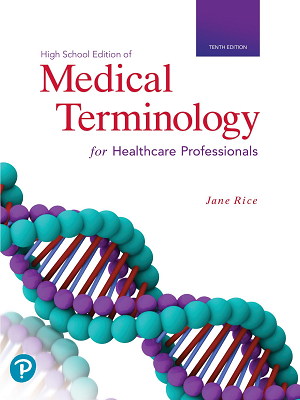
If you are looking to replace or supplement your existing medical terminology curriculum with a dedicated textbook, there are any number of medical terminology textbooks from which to choose.
Medical Terminology for Health Care Professionals is a solid choice for CTE health science instructors looking for an all-around quality text from a reputable education publisher.
In this book, you’ll find 21 chapters on healthcare terminology:
- Introduction to Medical Terminology
- Suffixes
- Prefixes
- Organization of the Body
- Integumentary System
- Skeletal System
- Muscular System
- Digestive System
- Cardiovascular System
- Blood and Lymphatic System
- Respiratory System
- Urinary System
- Endocrine System
- Nervous System
- Special Senses: The Ear
- Special Senses: The Eye
- Female Reproductive System with an Overview of Obstetrics
- Male Reproductive System
- Oncology
- Radiology and Nuclear Medicine
- Mental Health
Published in 2021 by Pearson, Medical Terminology for Health Care Professionals focuses on relating medical terms to specific health careers. It’s a great choice to use with students who struggle to see the purpose of learning complex and obscure terminology.
By focusing on the value of medical language to their specific future occupations, this book gives students a chance to hone in on those terms most relevant to their particular field. Meanwhile, they’ll still gain the comprehensive knowledge of medical terminology that will assist them in any health career.
In addition, the color-coded system for exploring word parts makes learning each term even easier.
Priced at $60 a copy, Medical Terminology for Health Care Professionals is relatively affordable compared to some textbooks. It’s a good fit for educators looking for a recently updated, well-rounded text that you can use in advanced courses.
2. Mastering Healthcare Terminology
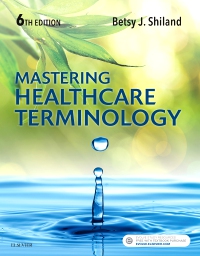
A second medical terminology text that is a great fit for a more advanced course is Mastering Healthcare Terminology by Betsy J. Shiland. In its sixth edition published in 2019, Mastering Healthcare Terminology helps medical professionals learn medical terms and definitions to effectively communicate in the field.
Mastering Healthcare Terminology differs from other texts in that its 16 chapters are divided into three overarching sections:
- Basic Terminology includes the first two chapters of the book. It introduces students to basic healthcare terminology and discusses the structure of the human body.
- The Body Systems section makes up the most significant portion of the text. Each of the 12 chapters focuses on a different body system and the terms connected with that system.
- Specialty Terminology consists of the last two chapters in the book. Medical terms in this section are presented in the context of behavioral health and oncology.
In addition to its clear organization, one of the strengths of this textbook is its wide use of case studies. In total, you’ll find over 100 case studies throughout that you can use with your students, plus ample practice exams and quizzes to check learners’ understanding along the way.
Mastering Healthcare Terminology is available for $84 a copy, a moderate price for a health science textbook. While it might be a bit too detailed for an introductory course, the in-depth content in this volume makes it a best fit for advanced high school classes and beyond.
3. Medical Language for Modern Health Care
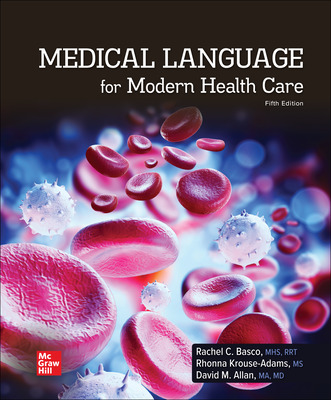
Medical Language for Modern Health Care is another excellent textbook for advanced high school medical terminology classes. Published by the venerable McGraw-Hill, the newest edition of the volume is up-to-date with a 2023 copyright.
Medical Language for Modern Health Care stands out for its contextual-based learning approach. Students discover each term in the healthcare context in which they are most likely to use the word. Each chapter is organized according to this approach, making it easy for learners to connect related terms.
This textbook includes the following 22 chapters:
- The Anatomy of Medical Terms
- Word Analysis and Communication
- The Body as a Whole
- Integumentary System
- Digestive System
- Urinary System
- Male Reproductive System
- Female Reproductive System
- Nervous System
- Cardiovascular System
- Blood
- Lymphatic and Immune System
- Respiratory System
- Skeletal System
- Muscles, Tendons, Physical Medicine, and Rehabilitation
- Special Senses of the Eye and Ear
- Endocrine System
- Mental Health
- Geriatrics
- Cancer
- Radiology and Nuclear Medicine
- Pharmacology
Medical Language for Modern Health Care is notable for the high level of detail within each chapter. You’ll find a full slate of terminology, along with exercises to help students reinforce their understanding and go beyond basic knowledge of the material.
This book is widely applicable for basic and more advanced medical terminology courses. However, it’s a bit more expensive than other books in its class. McGraw-Hill lists Medical Language at $97 for a loose-leaf version you can house in a binder or $130 for a fully bound, hardcover copy.
4. iCEV Medical Terminology Course
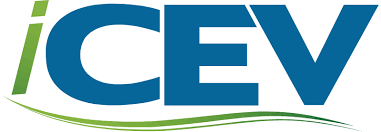
Although textbooks are a good fit for many courses, if you want a more interactive experience for students, you may want to consider a digital learning alternative.
Texas-based iCEV is a provider of online CTE courses. The iCEV Medical Terminology Course is designed for students in grades 9-12 and is one of several individually packaged courses offered by iCEV for students in the health science career pathway.
The iCEV Medical Terminology Course is delivered entirely online and introduces students to the structure of medical terms and their abbreviations.
If you purchase iCEV for medical terminology, you’ll receive:
- 26 total lessons
- 50 projects and activities
- 23 assessments
The lessons are divided into these categories:
- Body System Basics
- Diseases & Conditions
- Medical Records
- Medical Terms & Terminologies
- Morphemes
In this course, students interact with content through click-through slide presentations, activity worksheets, and vocabulary sheets.
iCEV does not disclose its pricing, so you’ll need to contact their sales department for the current cost of the medical terminology course. Each iCEV course functions separately from other classes, so if you intend on using other iCEV products, you’ll have to pay for each course separately.
This is a good fit for teachers looking for a straightforward, online option covering only medical terminology. However, instructors looking for a more comprehensive solution that works with their entire health science curriculum may want to look elsewhere.
5. NHA Medical Terminology
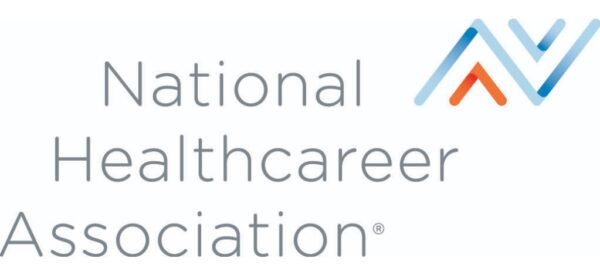
The National Healthcareer Association (NHA) is a popular certification provider in the health care industry. NHA certifications are recognized in many health science fields, and many high school CTE programs prepare students for NHA exams.
Recently, NHA has developed additional educational tools that extend beyond certifications. NHA Medical Terminology is an online resource of 16 instructional modules designed to help students master the language of healthcare through interactive learning.
With the NHA Medical Terminology materials, teachers receive:
- A single sign-on system with exportable grades
- An implementation guide
- Lesson plans
- Presentation slides
- Test bank
- Two section tests and a final exam
Meanwhile, students learn through a variety of methods, including:
- Animated videos
- Practice activities and flashcards
- Embedded audio pronunciations
- End-of-module quizzes
- Case studies, worksheets, and presentations
One of the benefits of this resource is the use of audio and video to help students with pronunciation, a big advantage over traditional textbooks. It’s also an excellent fit for schools that may already be working with NHA for certifications or other programs.
On the other hand, NHA Medical Terminology includes just one module on prefixes, suffixes, and concepts, compared with 13 concerning body systems. This isn’t much time to spend on the fundamental elements that make up medical language.
The National Healthcareer Association offers this product as a Special Certificate Program for $65 a student. If your institution is looking at other NHA programs, you can bundle the medical terminology materials with other products.
6. Dean Vaughn Career Prep

Dean Vaughn Career Prep offers one of the only digitally-based, medical terminology-specific curriculum resources out there. Designed to give students the ability to memorize and master medical terminology from the word parts upward, Dean Vaughn features both self-directed and instructor-led activities.
Dean Vaughn’s central focus is on the Greek and Latin word roots, prefixes, and suffixes that form most medical terms. When students master these basic building blocks, they will succeed in applying medical terminology to their future careers.
This digital curriculum includes the following resources:
- 12 hours of content
- 14 modules (including seven concerning prefixes, suffixes, and universal elements)
- 56 instructional videos
- 53 activities
- 20 quizzes
- Summative test
The strength of the Dean Vaughn program compared with other options is that half of the modules concern memorizing the elements of medical language. Students learn these elements through audio and visual tools that help them pronounce and retain each word and part. This makes this program a great fit for teachers and students who truly want to learn the language of medicine, and not just its applications.
On the other hand, teachers who are more concerned with reviewing body systems and making sure students understand the specific healthcare context of each term may want to consider other options.
Available for $69 per student for a six-month license, Dean Vaughn Career Prep is priced similarly to many textbooks but is delivered through a digital platform.
Teach Medical Terminology and More
Investing in an additional medical terminology curriculum resource can do wonders to help your students succeed in their health science classes and certification tests.
However, the curriculum resources you should invest in will depend on the type of learning experience you want to foster–and where your students need additional support the most.
If you’re looking for a general, overarching resource filled with terminology and applications for specific health careers, there are several high-quality medical terminology textbooks you can turn to.
On the other hand, if you favor an interactive experience that helps students memorize word parts, pronunciations, and more, a digital curriculum resource could be a better fit for you.
However, you should also consider how you can teach medical terminology as part of your overall CTE health science curriculum. Teaching medical terminology as part of a complete curriculum ensures your students learn medical language in a manner that is cohesive throughout their academic journey.
If you’re searching for a comprehensive solution that integrates medical terminology, consider HealthCenter21 from AES. HealthCenter21 features a complete curriculum for teaching CTE health science that saves you time while engaging and empowering your students.
Wondering if HealthCenter21 is right for you? Dive into the full list of health science curriculum topics here. You’ll find complete information about each subject within the AES curriculum system, including medical terminology, medical assisting, nurse assisting, and more.
-1.jpg)

